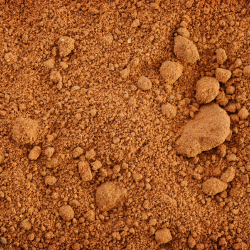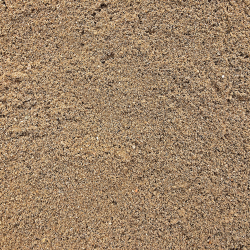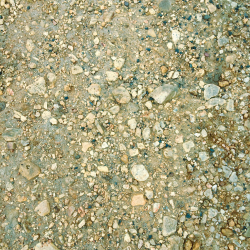
Growing healthy plants begins with healthy soil. With its diverse landscapes and elevations, Colorado presents a unique set of challenges for gardeners. Understanding the various soils across the state is essential for cultivating a successful garden. In this blog post, we’ll explore the different soil types in Colorado and provide valuable insights on how to overcome the challenges they pose.

Clay soils are prevalent in various regions of Colorado and are characterized by their fine particles and ability to retain water. If you notice that water tends to puddle on the surface of your soil rather than soak in, it’s likely you’re dealing with clay soil.
While water retention can be advantageous with clay soil, it can also mean poor drainage and soil compaction. This makes it difficult for plant roots to penetrate and receive essential nutrients from the soil.
Amending the soil with organic matter (compost, aged manure, peat moss, etc.) will help break up the clay and improve both soil structure and drainage. After planting, you can apply a layer of organic mulch to help regulate soil temperature, prevent water evaporation, and reduce soil compaction.
Sandy soils are characterized by their gritty texture and rapid drainage. While this prevents waterlogging and soil compaction, it poses other challenges.

The large soil particles of sandy soils dry out quickly and are often low in nutrients. Both water and fertilizer have a tendency to leach out of the soil before the plants can use them.
This soil can also benefit from added organic amendments. Well-rotted manure and organic compost can help fill in the spaces between the sandy particles and improve both water and nutrient retention. Soil Pep is an excellent amendment for sandy soils. It increases water retention and provides organic nutrients. Applying a top layer of mulch helps sandy soils retain moisture and prevent rapid evaporation, supporting plant growth.

Rocky soils are prevalent in the mountainous areas of Colorado. This type of soil poses challenges for both root development and nutrient absorption.
In most areas of our Rocky Mountains, soil is not soil at all, but mainly decomposed granite. To compensate for this, add sphagnum peat moss to new beds and work it into existing beds as part of spring cleanup and planting. Start with 3 inches of sphagnum peat moss over an area and work it down as far as the rocks in the area permit (hopefully 8–12 inches deep). Then, as you actually plant, add Nature’s Yield Compost to the area in a ratio of 1/3 compost to 2/3 soil.
How to Amend Your Soil
It’s pretty simple. You’ll want to add four cubic yards per 1,000 square feet of unamended soil. This is about 1½” thick on the ground. Then rototill to a depth of six inches. Each year, add organic materials about ½” thick and till them in to keep your soil in shape for a healthy growing season.
Choosing a Soil Amendment
There are a wide variety of soil amendments on the market, and it can be confusing to know which one would be best for your particular needs. If you need help choosing a soil amendment, just ask one of our garden experts. They’re more than happy to help you solve any soil problems. Below, we’ve listed a few of our recommended favorites.
Soil Pep loosens heavy soils and increases retention of water in sandy soils. It is commonly used as an amendment to add organic nutrients to the soil. It can also be used as mulch or a top dressing.
Nature’s Yield Compost is a 100% organic, premium soil conditioner. It improves soil structure, helps retain soil moisture, and is biologically active with microbes, which revitalizes the soil.
Earth Essentials Cow & Compost provides both dairy cow manure and compost, organic matter that will increase the fertility of the soil. It improves the drainage of heavy clay soils and increases the moisture retention of sandy soils.
Black Gold Garden Compost is an organic, ready-to-use compost that is OMRI-listed. It helps your garden grow plants that are strong, healthy, and productive all season long.
Successfully navigating Colorado soils involves understanding the unique characteristics of each type and implementing strategic gardening practices. By amending the soil, gardeners can overcome the challenges posed by clay, sandy, and rocky soils. With a bit of knowledge and effort, anyone can cultivate a thriving garden in the diverse and beautiful landscapes of Colorado.